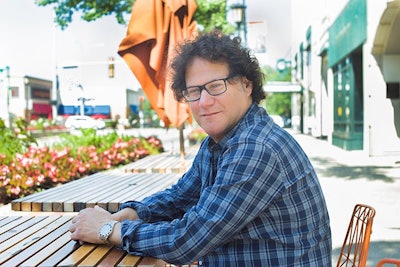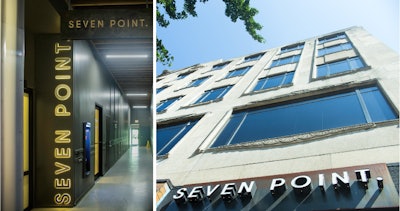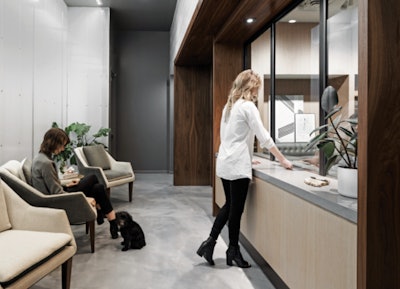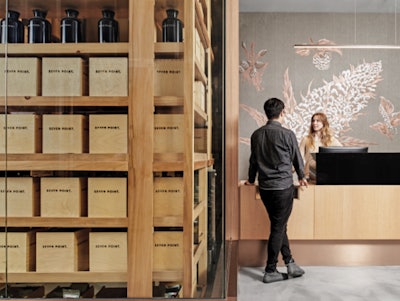
In the show, Hannibal—the brains driving the team—frequently utters his catch phrase (“I love it when a plan comes together”) with gumption when one of his plans succeeds, albeit usually not how he had envisioned.
Brad Zerman is the Hannibal of Seven Point, a 3,500-square-foot medical dispensary operating in Oak Park, Ill. As owner and CEO, Zerman has developed numerous plans for his dispensary, and while not all have worked out as originally intended, they have come to fruition one way or another. Prior to opening in 2015, Zerman had to switch locations due to unwelcoming neighbors, but he says his new (and current) location is far superior. His patient-education workshops morphed into the dispensary’s marketing campaign, which coincidentally became how he found his employees. Isn’t it nice when a plan comes together?
Here, Zerman expands on the creation of those workshops and their offerings, predicts the future of adult-use cannabis in Illinois, offers advice to industry newbies and more.
Scott Guthrie: The shop has a modern design. Why did you choose this style?
Brad Zerman: Our goal was to make the dispensary not look like a medical office. We have a lot of different rooms: We have a public waiting room, a patient waiting room, a dispensing room, a private consulting room [and] a delivery room. But I didn’t want a lot of dry wall. I hired a designer who was looking to get into the cannabis space and whose office was five minutes from my house. I met with them and hired them, and that was the best decision I made because they were fabulous. They had me fill out a huge questionnaire, probably 100 questions, and they extrapolated from my answers that I wanted the dispensary to be more open and inviting and have a more laid-back, appealing feel. I wanted it to be well lit, but a good ambiance. The exterior of our dispensary is all polycarbonate walls, and then the walls that separate the patient waiting room from the dispensing room are also polycarbonate. You can see light and shadows, but you can’t see anyone. It makes it more of an open feel than if you’re just staring at a wall.
Guthrie: What is the biggest challenge of operating a medical dispensary in Illinois?
Zerman: We have a lack of banking now in the state. One of the biggest banks here that was banking half the industry backed out, and I just lost my account a week ago. So that’s going to be tough. We are just starting to operate on a cash basis for payroll and paying vendors. It’s a nightmare, but we’re going to do it and see what happens. The other issue is the 280E tax law. It makes it impossible for a dispensary owner to make any money in the business. It just costs money to operate because you can’t take regular business deductions.

Guthrie: You offer educational workshops for patients. What was the motivation behind this and what type of information are you providing?
Zerman: That’s really been our strong point. We’ve had hundreds of [workshops]. I hired a licensed clinical social worker who lives in Oak Park, and we developed this educational program. We made one for patients, and we made one for physicians. We started going to meet with doctors, started holding educational events at the Oak Park Public Library, and people came. First it started as just a PowerPoint to show people the benefits of medical cannabis, but it quickly moved into [a medical card] application-processing workshop because everyone kind of gets the benefits now; they just want to apply.
In Illinois, there’s a lot of red tape. You have to get finger-printed, provide a passport photo, doctor application, fees—so you [have] to bring all of that together. We do all of that in our workshops. We held them in the libraries, and we’d bring mobile finger-printers, and we gave people coupons to use at our dispensary to cover the cost of the finger-print. That’s what we still do, and we do about eight of these workshops a month. We were basically helping the whole industry get new patients because we weren’t open [when we started these workshops]. We opened strong with about 75 patients in the first three days and a couple hundred in the first month or two. We were really happy that the workshops and the marketing all worked.
Now that we’re open, we developed a space next door to the dispensary that we call a community room. We continue to do these workshops on Thursdays and one Saturday a month in this room, and so we’re registering people every week at that. We are still doing some public libraries in neighboring towns every month. So that’s really our marketing program—these workshops.
Guthrie: There may be a question regarding legalizing recreational marijuana on the Illinois ballot in November. How far away do you think the state is from legalizing adult-use marijuana?
Zerman: I think it’s 100-percent [dependent on] what happens in the gubernatorial race in November. We have a candidate, J.B. Pritzker, who said that he’ll legalize cannabis as soon as he’s in office. There’s a [bill being developed] by two lawmakers here who have been working on [it] for about a year. Our industry association, the Medical Cannabis Alliance of Illinois—I’m on the board of directors—[is] in conversations with those lawmakers to discuss what [legalizing adult-use means] for the medical cannabis licensee currently. What would happen? Can we get more licenses? Can we get some time to be open before [the recreational dispensaries]? These are the things that our industry is concerned about. But … there’s people working on it. They’re trying to get the coalitions to support it. If J.B. Pritzker wins, I’m sure they’ll probably put it up for a vote in the first session possible next year. I think it would take time, a couple years probably, to develop the rules and do application processing. But if [Bruce] Rauner remains governor, then I would say the bill would almost be a waste of time given his stance on it—he says he’ll veto anything [cannabis-related].
Guthrie: Illinois lawmakers are also considering allowing medical marijuana as a substitute for opioids. In your opinion, is this a good idea and why?
Zerman: The senator whose bill that is, is … the senator for the district that we’re in. His name is Senator Don Harmon. Our industry association has had conversations with the senator and his team to help advise on the rules in the industry, so he can develop the bill in a way that makes sense. He’s super supportive of the industry and wants to help patients get relief. I see him around; he’s always positive about it. It’s great that he decided to do this because it’s a backdoor way to get pain added as a condition to the program in Illinois. It’s a smart move, and we’ll have to see. It passed in the Senate, overwhelmingly bipartisan, and I’m hearing good things about what’s happening in the House. But the question is, will the house have a super majority passing the vote? Otherwise, the governor would probably veto it. (Note: Since this interview, the bill passed in the House with a super-majority. Gov. Bruce Rauner signed SB 336 on Aug. 28.)

Guthrie: Is finding qualified staff difficult in Illinois?
Zerman: We’ve had the same staff that we hired a year and three quarters ago; we’ve added a few people since then. My first couple of hires were people that found me during the application process, when I didn’t even know if I was going to have a license. Those people [helped plan and conduct] the workshops that we started doing.
From there, we mostly hired everyone else from those workshops. They were patients who came in and who we helped register for the program. We pretty much hired organically through our own marketing efforts with the workshops or patients that are coming here, and usually that’s who we look to [hire first].
Not all those people had a lot of knowledge about [cannabis], but they had a lot of interest. We sponsored a lot of training for the early people. We brought in Martin Lee from Project CBD the week before we opened. Two or three people a year we’ve been sending to the CannMed conference. My head person, who was my first hire, ... is in charge of education and training. We have training requirements in Illinois of eight hours, so we’re always giving people different videos and studies to read, and that’s part of their training. Because they are patients, they can try all the products, and we give really serious staff discounts, like 40-percent off. We encourage them and want them to buy as much as they can so they can become the most knowledgeable. So, the staff really just has to come here and want to learn, and they’re going to learn everything—from the actual products to going to ... trainings to being trained in-house and learning on the job.

Guthrie: Being near a major city like Chicago, do you worry about product diversion?
Zerman: We haven’t experienced anything like that. We have a real tight ship and stringent regulations in Illinois. We have 30 cameras, maybe 31, in and around our space. No one can do anything here without being seen. We’ve looked at hundreds of hours of video for different compliance issues, and we see everything. So that, coupled with the fact that the state requires us to take inventory every day, ensures that we have everything every day. If we are missing something, we are going to know the next day.
Guthrie: How did you garner community support prior to opening and in your early days?
Zerman: It’s part of the application process—you have to get community support. We applied for three licenses in three different areas, and they were all commercial areas, so we did a lot of outreach just for the application. We went and joined chambers of commerce. We met merchants. We met our neighbors. We tried to find out if they were OK with it so that we could report all that back to the state, where we would get [application] points for doing that outreach in a competitive scoring situation.
We were supposed to be in a different location, in a shopping center, and Oak Park was really open to the whole thing. There wasn’t really any pushback except in the shopping center that I was supposed to go in. There were one or two neighbors that didn’t want it.
When I went to look for a better spot in the downtown area, I found the only building in the few-block area that was 1,000 feet from a daycare. The landlord was OK with it, so we moved forward. Ultimately, the Village [of Oak Park] was happy with the choice because it’s a 100-percent commercial area. Because I joined the chamber [of commerce] a year before I opened, I got to know those people and went to some events. I started meeting doctors, and we started sponsoring health fairs. We really got involved in the community. We are really just like any other merchant here.
Guthrie: What do you enjoy most about working in the medical cannabis field?
Zerman: It’s really been interesting to see how all of this stuff that we are doing has come together in a positive way. What I mean by that is how the vision for the workshops—as a way to help patients navigate the red tape—became our marketing program, [which became how we hire].
Then seeing people get relief from pain and insomnia and appetite issues has been super rewarding. I’m also in charge of ordering with another person, so I’m paying a lot of attention to all the new products that are in the market. It’s great to learn about all the new, different forms. We have a lot of products that are coming from out West that the cultivators here are licensing, so we’re really seeing the best of the best here in Illinois.
Guthrie: What advice would you give to someone who is looking to open a medical dispensary?
Zerman: My advice would be to partner with someone who knows what they’re doing. If you have unlimited funds, you need to hire the most experienced attorneys in the country who have helped people win licenses in competitive states. They can help you with your application, but you [also have] to bring in capital, real estate, a team of people who have strong credentials. That’s what you need to get the license. Then you need a lot of business experience to make it work. From banking to armored couriers to taxes and marketing, there’s just so much involved that if you partnered with someone who has some of those things, then you’re going to have a better success rate.
Editor’s note: This interview was conducted May 18, 2018, and has been edited for style, length and clarity.
Scott Guthrie is the senior editor of Cannabis Dispensary.
Top photo © Kayla Todd

























